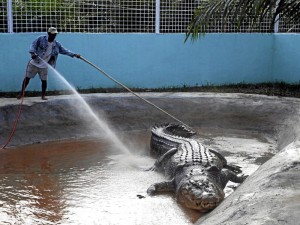Guinness, NatGeo delay visits with Lolong, the giant croc

GOING FOR GUINNESS. Guinness and National Geographic Representatives are coming to Agusan del Sur to determine whether “Lolong” is the largest salt water crocodile in captivity. INQUIRER FILE PHOTO
DAVAO CITY, Philippines—Guinness World Records and the National Geographic Society have delayed planned visits to Agusan del Sur to document and validate claims that Lolong, a 1.075-ton saltwater crocodile captured in the province on September 3, is indeed the largest reptile in captivity, the mayor of the town where the crocodile is being kept said Saturday.
Mayor Edwin Elorde of Bunawan, Agusan del Sur, had said earlier that Guinness representatives had advised him they expected to arrive in his town on Monday or Tuesday. But on Saturday, Elorde said the validation process may actually take place next month.
He said Guinness had informed him that it was still looking for a validator to determine if Lolong was indeed the biggest saltwater crocodile in captivity.
“Guinness is still looking for a validator because it’s a different category,” Elorde told the Inquirer by phone.
But Elorde said he suspected that Guinness was not ready to update its record yet of the biggest saltwater crocodile in captivity, which it recently bestowed on Cassius, a 17-foot-11.75 inch-long saltwater crocodile caught in Australia.
Aside from Guinness, Elorde said, the National Geographic Society also informed him that their documentation process on Lolong would be delayed too because it has yet to convene a team for the job.
“The NatGeo thought they can convene a team so easy but they found out it was hard because the members will come from different countries,” he said.
Elorde said that if Lolong is finally recognized as the biggest crocodile in Guinness’ Book of World Records, the croc’s hold on that record might not last long.
Elorde said that when Lolong was captured, another crocodile lurked nearby and the hunters who saw it said it was much larger than Lolong.
“The head was larger and its back wider,” Elorde said.
He said unlike Lolong, the other reptile did not take the bait they used.
He said it was possible that the 98,000-hectare Agusan Marsh was home to many crocodiles larger than Lolong.
There are an estimated 5,000 crocodiles of various types in the wetlands, which also host large number of wildlife species, Elorde said.
“It is possible that some of the crocodiles can grow so big because their habitat remains undisturbed for years,” he said.
He said even some animals from other species were larger than usual because of this condition.
He cited the case of “fishes that grow and weigh more than nine kilograms and snails growing to about nine inches long.”
Since Lolong’s capture, Elorde said many surprises have come Bunawan’s way. Aside from renewed interest in what Bunawan could offer besides Lolong, he said, government agencies have started lining up projects for the town, one of the country’s poorest.
“Before it was very difficult to ask for projects, but now they are the ones who are coming to us and making proposals,” he said.
Lolong is now housed in a concrete cage and with a pond.
Josephine De Leon, wildlife division chief of the Department of Environment and Natural Resources, had examined Lolong and concluded that the reptile was in good health.
But as of Saturday Lolong was still uninterested in the chicken offered to him.
Elorde said they were not worrying about this because experts had told them Lolong might have eaten before he was captured and that he was still full.
“It is normal for crocodiles not to eat for days or even months,” he said.
Elorde said what they were striving for now was to give Lolong ample rest despite the number of people coming over to view him.
“There would be days intended for viewing and a day for Lolong’s rest,” Elorde said.